

Zen Buddhism. ZEN:MUSIC FOR BALANCE AND RELAXATION[FULL ALBUM]HD. » Letting Go of Attachment, from A to Zen. “Most of our troubles are due to our passionate desire for and attachment to things that we misapprehend as enduring entities.”
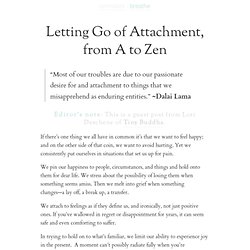
~Dalai Lama Editor’s note: This is a guest post from Lori Deschene of Tiny Buddha. If there’s one thing we all have in common it’s that we want to feel happy; and on the other side of that coin, we want to avoid hurting. Yet we consistently put ourselves in situations that set us up for pain. We pin our happiness to people, circumstances, and things and hold onto them for dear life.
ASIAN ZEN SPA MUSIC MEDITATION - ZEN SPA. Zen Poems and Koans. The Simple Tao (Simple Taoism) The Way is to benefit others and not to injure. The Way is to act but not to compete.It does not show greatness and is therefore truly great. Be still like a mountain and flow like a great river Tao"the way", "the path". it is often represented by water because water always seeks the path of least resistance, yet is strong enough to demolish even stone when no other recourse is available. everything below flows from this.
Here are 10 guides to the Way. The Daily Tao Te Ching. Tao te ching @ mattpaul.org. » Start Here. By Leo Babauta I know a lot of people who fall into a slump, losing the habit of exercise, procrastinating with work, slipping into a bad diet, and generally not feeling motivated.
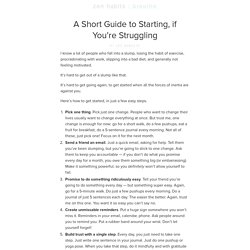
It’s hard to get out of a slump like that. It’s hard to get going again, to get started when all the forces of inertia are against you. :zenhabits. » How to be Insanely Productive and Still Keep Smiling. Editor’s note: This is a guest post from Mary Jaksch of Goodlife ZEN.
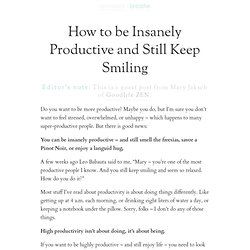
Do you want to be more productive? Maybe you do, but I’m sure you don’t want to feel stressed, overwhelmed, or unhappy – which happens to many super-productive people. But there is good news: You can be insanely productive – and still smell the freesias, savor a Pinot Noir, or enjoy a languid hug. A few weeks ago Leo Babauta said to me, “Mary – you’re one of the most productive people I know. Most stuff I’ve read about productivity is about doing things differently. Zencast.org. Zencast.org. The Simple Tao (Simple Taoism) The Way is to benefit others and not to injure. The Way is to act but not to compete.It does not show greatness and is therefore truly great. Be still like a mountain and flow like a great river Tao"the way", "the path". it is often represented by water because water always seeks the path of least resistance, yet is strong enough to demolish even stone when no other recourse is available. everything below flows from this.
How to do Zazen - Seated Meditation Video. Hi, I am Patrick and today we are talking about Zazen and how to do it.

Meditation isn't just for buddhas or monks; it's for everybody that can be done at almost any time. Living Zen: Awareness (October 21, 2009) BEGINNER'S GUIDE ... © 1995 Dharman Craig PressonAll Rights Reserved “Zen is not what you think!”
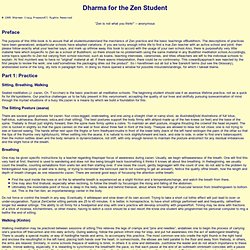
-- anonymous Preface The purpose of this little book is to assure that all studentsunderstand the mechanics of Zen practice and the basic teachings ofBuddhism. The descriptions of practices have been generalized, andparticular schools have adopted variations. Part 1: Practice Sitting, Breathing, Walking Seated meditation (J. zazen, Ch.
The Sitting Posture (asana) There are several good postures for zazen: four cross-legged, onekneeling, and one using a straight chair or camp stool, as illustrated[Add illustrations of full lotus, half-lotus, sukhasana, Burmese, seiza,and chair sitting]. Breathing One may be given specific instructions by a teacher regarding theproper focus of awareness during zazen. Do not force or control the breath in any way. Walking (Kinhin) Part 2: Theory The Buddha The Dharma The Four Noble Truths. Zen Koans - AshidaKim.com. 2.
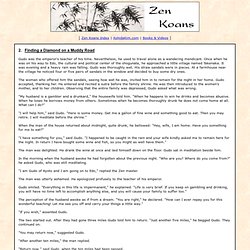
Finding a Diamond on a Muddy Road Gudo was the emperor's teacher of his time. Nevertheless, he used to travel alone as a wandering mendicant. Once when he was on his way to Edo, the cultural and political center of the shogunate, he approached a little village named Takenaka. It was evening and a heavy rain was falling. The woman who offered him the sandals, seeing how wet he was, invited him in to remain for the night in her home. "My husband is a gambler and a drunkard," the housewife told him. "I will help him," said Gudo. When the man of the house returned about midnight, quite drunk, he bellowed: "Hey, wife, I am home. "I have something for you," said Gudo.